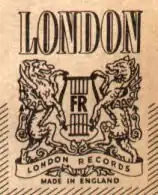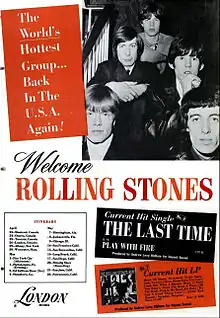London Recordings
London Recordings (or London Records and London Music Stream) is a British record label that marketed records in the United States, Canada, and Latin America for Decca Records from 1947 to 1980 before becoming semi-independent. The London name - as London American Recordings, often shortened to London American - was also used by British Decca in the UK market, for releases taken from American labels which British Decca licensed.
| London Recordings | |
|---|---|
 | |
| Parent company | Universal Music Group (pre-1980 catalogue, London USA, and trademark rights for "London Records" and "London Recordings" names and logos) Because Music (label and most of post-1980 catalogues, also licenses trademarks from UMG) Warner Music Group (New Order catalogue and certain releases of post-1998 catalogue) |
| Founded | 1947 |
| Founder | Edward Lewis |
| Distributor(s) | Decca Records/UMe (pre-1980 catalogue) Caroline Distribution (most of post-1980 catalogues) Rhino Entertainment (New Order, All Saints, Slash Records) |
| Genre | Various |
| Country of origin | United Kingdom |
| Official website | www |
The label is owned by Because Music, which also owned most of the post-1980 and post-1998 catalogues.
History

London arose from the split in ownership between the British and American branches of Decca Records. The American branch of London Records released British Decca records in the U.S. since British Decca could not use the "Decca" name there. The label was noted for classical albums made in then state-of-the-art stereophonic sound, and such artists as Georg Solti, Joan Sutherland and Luciano Pavarotti.
The London name was also used by British Decca in the UK market for releases taken from American labels which British Decca licensed, such as Imperial, Chess, Dot, Atlantic, Specialty, Essex and Sun, and the first two UK releases from Motown. By the 1960s more licensing deals had been made with Big Top, Monument, Parrot, Philles, and Hi, and subsidiary labels were London Atlantic, London Dot and London Monument (the last featuring Roy Orbison, who remained with London in the UK even after he signed for MGM Records in the U.S.).
An unusual feature was the letter code in the numbering system. From the late 1950s until 1973, the label bore the logo "London American Recordings", and on Radio Luxembourg it was known as "London American".

In America, the label was best known as the American imprint of the pre–1971 recordings of the Rolling Stones (owned by ABKCO). The label also originally issued some early LPs and singles by Texas-based band ZZ Top (whose catalog went to Warner Brothers when the band moved there).
In the late 1970s, London signed deals with Bomp! Records and with Big Sound in Connecticut, U.S. This changed the label in the eyes of many from a backwater into something a little more "edgy" compared to the pedestrian contemporary releases from parent company Decca. The label was staffed by Graham Baker, Keith Gooden, Mike Horsham and Liz Roff at that time. Decca’s Geoff Milne was in overall control.
The president of London Records in the 1970s was D. H. Tollerbond.[1]
After British Decca was acquired by PolyGram in 1980, London followed a more independent course with subsidiary labels such as Slash, Pete Tong's Essential Records and FFRR.
Universal Music Group (the owner of American Decca) acquired PolyGram in 1998;[2] however, by this time, London Records had become a semi-independent label within the PolyGram group operated by Roger Ames. In the 1990s Tracy Bennet became President and Colin Bell, Managing Director. When Ames moved to the Warner Music Group, he took the label with him, and so almost all of London's recent back catalogue was acquired by Warner, which also acquired the London name and trademark from Decca[3] (which still owns most of the pre-1980 back catalogue). The name is still used, mainly for UK-based artists, and for ex-Factory Records artists. Notable artists released by that incarnation of London, called London Records 90, include New Order (initially on their own CentreDate Co. Ltd label),[4] Happy Mondays, A, and Shakespears Sister.
After PolyGram took over British Decca, classical-music albums recorded by British Decca continued to be released on the London label in the U.S., with a logo similar to the Decca classical label logo, until American Decca owner Universal bought British Decca owner PolyGram in 1998, after which they were all reissued on the original British Decca label in the U.S.
The London pop music catalogue owned by Universal Music is now managed by Polydor Records, with US distribution handled by Island Records after absorbing former distributor Mercury Records in 2014. Decca Records had a recording studio in Blomfield Road, West London; there may have been another in London's West End. In 2010, Universal Music reclaimed ownership of the London Records trademark. Even Universal Music again owned this trademark, Warner Music Group licensed it to be used on its reissues of London's catalogue controlled by Warner Records 90 company. On 1 July 2011 Universal Music reclaimed the London Records name and relaunched it under the executive team of Nick Raphael (president) and later Jo Charrington (senior vice president of A&R) who together previously ran Epic Records for Sony Music Entertainment since 2001. Both had started their careers at London Records in the Ames era in the 1990s.[5]
When Nick Raphael became president of Capitol Records's UK division in 2013, London Records moved there,[6] and operated as a sublabel until Because Music acquired the trademark license in 2017.
In July 2017, Because Music announced that it would acquire Warner Records 90, a subsidiary of Warner Music UK that reissued most London Records artists from the post-1980 era, plus very few titles from the post-1998 era, when Warner Music owned the label. Because completed the deal in August 2017, which includes the rights to over fifty London artists (including Bananarama and Happy Mondays), but excluding Slash Records, All Saints, and New Order.[7]
Warner Records 90 was renamed London Music Stream, and later London Recordings.[8]
Subsidiary or associated labels
London Records had dozens of subsidiary and distributed labels throughout its existence. Among the labels are:
Artists
- Ace of Base
- All Saints
- Ernest Ansermet
- The Bachelors
- Bananarama
- Blancmange
- Bloodstone
- Teresa Brewer
- Bronski Beat
- Kate Ceberano
- Dollar
- Marianne Faithfull
- Shane Filan
- Fine Young Cannibals
- Funkapolitan
- Garolou
- Genesis
- Buddy Greco
- Grotus
- Adelaide Hall
- The Kinks
- Lisp
- Guy Lombardo
- Los Bravos
- Vera Lynn
- Mantovani
- Marion
- Marmalade
- John Mayall and the Bluesbreakers
- Meat Puppets
- Dannii Minogue
- Mirjam & Stephen
- The Moody Blues
- The Nashville Teens
- No Sweat
- Onslaught
- Perfect Day
- The Poppy Family
- Queen B
- The Rolling Stones
- Salt N Pepa
- Savoy Brown
- Seona Dancing
- The 6ths
- Sleep
- Sparks
- Specimen
- Sugababes
- Then Jerico
- The Tornados
- Total Contrast
- Unit 4 + 2
- Universal
- Holly Valance
- Whigfield
- Win
- Y&T
- Zulema
- ZZ Top
1990s
- A
- All Saints
- Back to the Planet
- Banderas
- Chumbawamba (over One Little Indian Records from 1993–1995)
- East 17
- Gay Dad
- The High
- Junior
- Kaliphz
- Marion
- Glenn Medeiros
- Menswear
- Dannii Minogue
- New Order
- No Sweat
- Onslaught
- Michelle Shocked
- Showbiz & A.G.
- Jimmy Somerville
- Michaela Strachan
- Sugababes
- Then Jerico
- Tin Machine (through Victory Music)
- Utah Saints
- Voice of the Beehive
- Wet Wet Wet
- The Yes/No People
- Zucchero
2010s (reopened label)
See also
- List of record labels
References
- Cat People, Bill Hayward, introduction by Rogers E. M. Whitaker. New York: Dolphin/Doubleday, 1978 (p. 132)
- "Polygram Holding, Inc.; Decca Music Group Limited; UMG Recordings, Inc.; and Universal Music & Video Distribution Corp". Federal Trade Commission. Retrieved 18 April 2007.
- "Case details for Community Trade Mark E3038437". Intellectual Property Office. Archived from the original on 30 September 2011. Retrieved 30 September 2008.
- https://www.officialcharts.com/artist/25394/new-order/
- "Raphael to relaunch London Records for Universal". CMU. 3CM Unlimited. 31 May 2011. Retrieved 13 August 2012.
- "Universal Music Group". Universalmusic.com. Retrieved 1 November 2015.
- "Because confirms acquisition of London Records catalogue - Music Business Worldwide". 6 July 2017. Retrieved 12 September 2018.
- "Because Group acquires catalogue of iconic London Records". Musicweek. 10 August 2017. Retrieved 12 September 2018.